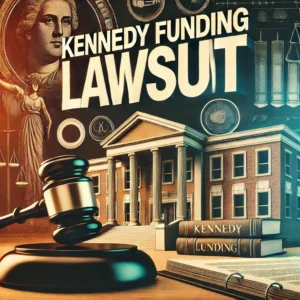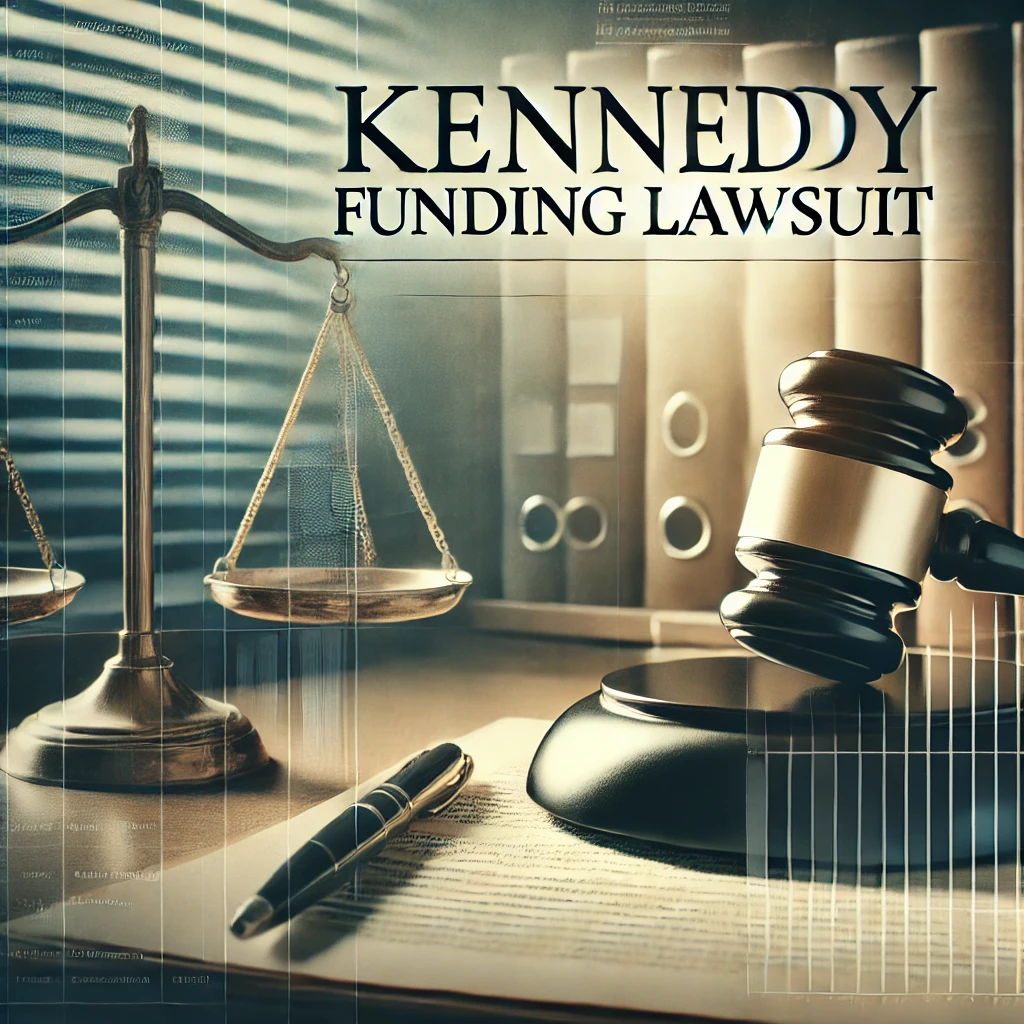The Kennedy Funding lawsuit has drawn significant attention due to the company’s controversial lending practices in the commercial real estate space. As one of the biggest private lenders specializing in bridge loans, Kennedy Funding has gained a reputation for high-risk loans. However, this reputation has also led to multiple legal disputes. In this article, we’ll dive deep into the background of the Kennedy Funding lawsuit, key issues at play, and the potential impacts on borrowers and the private lending sector.
What is Kennedy Funding?

Kennedy Funding is a private lender that has carved out a unique niche in the commercial real estate industry. Founded in the late 1980s, the company focuses on bridge loans, a type of short-term loan that helps borrowers “bridge” the gap until they can secure long-term financing. These loans are particularly popular for commercial real estate projects that may not meet the strict requirements of traditional banks.
Kennedy Funding has built its business on offering fast capital with fewer restrictions, often making it a go-to option for developers and investors. Loans can range from $1 million to over $100 million, and the company has financed projects across the United States and internationally. However, this willingness to lend where others won’t has led to concerns about transparency, excessive fees, and unfair business practices.
Overview of the Kennedy Funding Lawsuit
The Kennedy Funding lawsuit revolves around allegations of unfair lending practices and predatory behavior. Multiple borrowers have taken legal action against the company, accusing them of misleading loan terms, excessive fees, and breach of contract. These lawsuits claim that Kennedy Funding has taken advantage of borrowers in financial distress, leaving them in precarious positions.
The company’s approach to high-risk loans has placed them under scrutiny, and the lawsuit brings attention to whether Kennedy Funding operates within the boundaries of fair lending practices.
Detailed Case Studies
Two major legal cases exemplify the problems borrowers have faced with Kennedy Funding. These lawsuits highlight the complexity and controversy surrounding the company’s lending activities.
The Shelton Case: A Closer Look
One of the most notable legal battles involving Kennedy Funding is Shelton v. Kennedy Funding, Inc. In this case, Virgil Shelton sold the Rest in Peace Cemetery to Willie Acklin, who agreed to pay in installments. When Acklin experienced financial difficulties, he sought a loan from Kennedy Funding. The lender provided the loan, but withheld $675,000 intended for Shelton.
When Acklin defaulted on the loan, Kennedy Funding initiated foreclosure on the cemetery, but still failed to pay Shelton the owed amount. Shelton filed a lawsuit, accusing Kennedy Funding of violating Arkansas’ Statute of Frauds and engaging in deceptive business practices. The court ultimately ruled in Shelton’s favor, awarding him $675,000 in compensatory damages.
Greenwich Landing Case
In another significant lawsuit, Kennedy Funding, Inc. v. Greenwich Landing, LLC, the company found itself in a legal battle over its role as an agent for multiple parties. Kennedy Funding issued a mortgage to Greenwich Landing and sought to foreclose on the property when payments fell through. The legal issue at hand was whether Kennedy Funding, as an agent for multiple principals, could still bring action against one of the parties.
The court sided with Kennedy Funding, allowing the foreclosure to proceed. While the lender won the case, it raised concerns about the company’s ability to act on behalf of multiple parties and still maintain transparency and fairness.
Legal Framework for Lending Practices
The Kennedy Funding lawsuit brings up several legal issues related to lending practices. One key area of concern is whether Kennedy Funding complies with federal and state lending regulations, particularly those designed to protect borrowers from predatory lending practices.
The Truth in Lending Act (TILA) is a critical piece of legislation that requires lenders to disclose key terms and costs associated with loans. Borrowers have argued that Kennedy Funding failed to clearly communicate loan terms, leading to financial harm. Some plaintiffs claim they were blindsided by last-minute changes to loan terms or excessive fees not disclosed at the beginning of the loan process.
In addition to TILA, state regulations may impose further requirements on lenders to ensure fairness and transparency. However, Kennedy Funding has been accused of skirting these regulations to benefit from risky loans.
Key Issues Raised in the Lawsuits
The Kennedy Funding lawsuit highlights several critical issues in the lending industry. These include:
- Misleading Loan Terms: Borrowers claim they were not fully informed about the terms of their loans, which led to unexpected costs or restrictive conditions.
- Excessive Fees: Some plaintiffs allege that Kennedy Funding imposed exorbitant fees that were not clearly outlined in the loan agreements.
- Predatory Lending: There are accusations that the company specifically targeted borrowers in financial distress, offering loans with terms that were difficult to meet.
- Breach of Contract: Several lawsuits argue that Kennedy Funding failed to honor the terms of its loan agreements, leading to financial hardships for borrowers.
These issues paint a picture of a lender willing to push the limits of legality, potentially at the expense of borrowers who may already be in a vulnerable financial position.
Impact on Borrowers
For borrowers, the Kennedy Funding lawsuit serves as a warning about the risks of dealing with private lenders. Bridge loans can be a valuable tool for securing quick financing, but they come with significant risks. Borrowers should be cautious about entering into agreements with lenders like Kennedy Funding, ensuring they fully understand the terms and potential costs associated with these loans.
The lawsuits have shown that Kennedy Funding’s business practices can put borrowers in precarious situations, especially when loan terms are not clearly disclosed. As a result, potential borrowers should be vigilant and seek legal or financial advice before signing any loan agreements.
How Borrowers Can Protect Themselves
Given the allegations against Kennedy Funding, borrowers must take steps to protect themselves from unfair lending practices. Here are a few tips:
- Review Loan Agreements Carefully: Make sure to read and understand every aspect of the loan agreement, including fees, interest rates, and repayment terms.
- Ask Questions: Don’t hesitate to ask the lender to clarify any terms that seem unclear. It’s better to be informed before signing a contract.
- Consult Legal Advisors: Working with a legal or financial advisor can help you identify any potential pitfalls in the loan agreement.
- Beware of Last-Minute Changes: Keep an eye out for any sudden changes to loan terms, especially as the closing date approaches. Make sure all terms are finalized and agreed upon before signing.
Comparing Kennedy Funding to Competitors
While Kennedy Funding is a prominent player in the commercial real estate lending market, it is not the only private lender offering bridge loans. Other companies, such as hard money lenders or smaller private lending firms, also provide quick financing for high-risk projects. However, Kennedy Funding’s size and aggressive lending practices set it apart from many competitors.
Borrowers should compare the terms and conditions of loans from multiple lenders before making a decision. While Kennedy Funding may offer fast approvals, the costs associated with their loans could outweigh the benefits for some borrowers.
Future of Private Lending After the Kennedy Funding Lawsuit
The Kennedy Funding lawsuit could have significant implications for the future of private lending, particularly in the commercial real estate space. If the courts rule against Kennedy Funding, it could lead to stricter regulations for private lenders, ensuring greater transparency and fairness in loan agreements.
These regulations could force private lenders to be more transparent about fees, loan terms, and risks. For borrowers, this would be a positive development, as it would provide better protection against predatory lending practices.
On the other hand, if Kennedy Funding wins the lawsuit, it could embolden other private lenders to continue or adopt similar aggressive lending practices. This would make the lending landscape riskier for borrowers and could lead to more legal battles down the road.
Conclusion
The Kennedy Funding lawsuit is a crucial case that highlights the challenges borrowers face in the private lending industry. Kennedy Funding’s approach to high-risk lending has landed the company in multiple legal battles, with allegations ranging from misleading loan terms to predatory lending practices.
For borrowers, the lesson is clear: always review loan agreements carefully and seek professional advice before entering into a contract. The outcome of the lawsuit could have far-reaching implications for the private lending sector, potentially reshaping how bridge loans are offered and regulated.
By staying informed and cautious, borrowers can protect themselves from falling victim to unfair lending practices and ensure they make the best financial decisions for their future.





